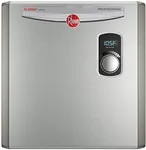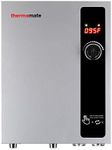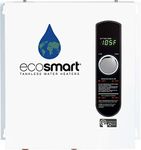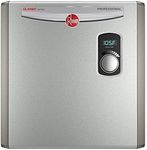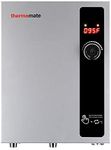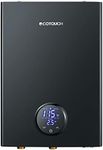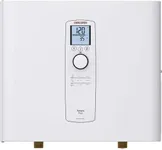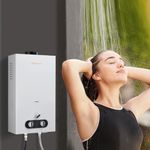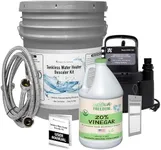Buying Guide for the Best Whole House Tankless Electric Hot Water Heaters
Choosing the right whole-house tankless electric hot water heater can significantly impact your home's comfort and energy efficiency. These systems provide hot water on demand, which means you won't run out of hot water and you can save on energy costs since they don't maintain a reservoir of hot water. However, selecting the right model involves understanding several key specifications to ensure it meets your household's needs. Here’s a guide to help you navigate through the essential specs and make an informed decision.Flow Rate (GPM)Flow rate, measured in gallons per minute (GPM), indicates how much hot water the unit can deliver at a time. This is crucial because it determines whether the heater can handle multiple hot water demands simultaneously, such as running a shower and a dishwasher. For smaller households with fewer simultaneous hot water needs, a lower GPM (around 3-5 GPM) may suffice. Larger households or those with higher hot water demands should look for units with higher GPM (6-10+ GPM). Assess your household's peak hot water usage to choose the right flow rate.
Temperature RiseTemperature rise refers to the increase in water temperature the unit can achieve. This is important because it affects how hot the water will be when it reaches your taps. The required temperature rise depends on your incoming water temperature and your desired output temperature. For instance, if your incoming water is 50°F and you want it at 120°F, you need a unit that can handle a 70°F rise. Colder climates may require units with higher temperature rise capabilities. Consider your local water temperature and your preferred hot water temperature to determine the necessary temperature rise.
Power (kW)The power rating, measured in kilowatts (kW), indicates the electrical power the unit uses to heat water. Higher kW ratings generally mean the unit can heat water more quickly and handle higher flow rates. Units typically range from 18 kW to 36 kW or more. Smaller households with lower hot water demands can opt for units on the lower end of the spectrum, while larger households or those with higher demands should consider higher kW ratings. Ensure your home's electrical system can support the power requirements of the unit you choose.
Energy EfficiencyEnergy efficiency measures how effectively the unit converts electrical energy into hot water, often expressed as a percentage. Higher efficiency means lower energy waste and reduced operating costs. Look for units with efficiency ratings of 90% or higher for the best performance. Consider your long-term energy savings and environmental impact when evaluating efficiency.
Installation RequirementsInstallation requirements include the electrical and space considerations necessary for setting up the unit. Tankless electric water heaters often require specific voltage and amperage, as well as adequate space for ventilation and maintenance. Ensure your home’s electrical system can accommodate the unit’s requirements, and that you have enough space for proper installation. Consulting with a professional installer can help you understand these needs and avoid potential issues.
WarrantyThe warranty provides an indication of the unit’s reliability and the manufacturer’s confidence in their product. Longer warranties can offer peace of mind and protection against defects or failures. Warranties typically range from 5 to 15 years. Consider how long you plan to stay in your home and your comfort level with potential repair costs when evaluating warranty options.
